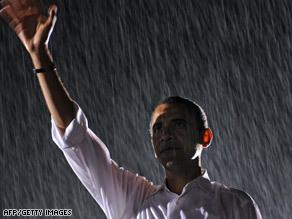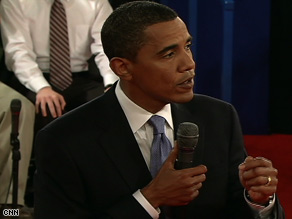
Sens. John McCain and Barack Obama meet at Hofstra University for the third and final presidential debate. (Reuters)
After weeks of economic upheaval and a day that brought another precipitous drop in the stock market, Sens. John McCain (R) and Barack Obama (D) tonight held a final presidential debate marked by a combative series of disputes on abortion, the economic crisis and which man has run the more negative campaign.
McCain entered the night trailing in the polls and needing a clear victory to reverse the direction of his campaign, which has been hurt by the continuing focus on the troubled economy. The GOP nominee has struggled to separate himself from the policies of the unpopular Bush administration, and tonight he repeatedly made clear that he was his own man and would go in a "new direction."
"Senator Obama, I am not President Bush," McCain said, after the Democrat pointed out that he had voted for Bush's budget proposals. "If you wanted to run against President Bush, you should have run four years ago."
That forceful line did not deter Obama from his most frequent avenue of attack. "If I've occasionally mistaken your policies for George Bush's policies, it's because ... you have been a vigorous supporter of President Bush," he said.
The tone of the debate was more aggressive than the previous two, as McCain came prepared to criticize Obama on seemingly every front and put a dent in the Democrat's growing lead. Twice, McCain sarcastically noted Obama's "eloquence" and suggested that he was fudging the issues. While Obama on several occasions was forced to rebut McCain's attacks, none seemed to visibilty throw the Democrat off stride or mark a campaign-changing moment.
McCain also raised for the first time in any of the debates Obama's relationship with Weather Underground founder William Ayers, and also referenced ACORN, a community organizing group that has been accused of fraudulent voter registrations.
Having been criticized in previous sessions for not discussing the middle class, McCain sought tonight to identify with the common man, specifically "Joe the Plumber," an Ohioan whom Obama met on the campaign trail this week and who asked whether the Democrats' plans meant his taxes would go up. McCain made repeated references to the plumber in taking potshots at Obama and his economic proposals.
There was considerable speculation in the run-up to the debate over whether McCain would raise the subject of Obama's relationship with Ayers, a subject of McCain campaign ads and campaign speeches by Gov. Sarah Palin, McCain's vice presidential running mate.
Obama reiterated previous statements that he was only eight years old when Ayers engaged in domestic terrorist activities 40 years ago, that he only knew him casually, and rejected the suggestion that Ayers helped launch his political career in Illinois. (Both Obama and Ayers were members of the board of an anti-poverty group, the Woods Fund of Chicago, between 1999 and 2002. In addition, Ayers contributed $200 to Obama's re-election fund to the Illinois State Senate in April 2001. They lived within a few blocks of each other in the trendy Hyde Park section of Chicago, and moved in the same liberal-progressive circles.)
The subjects of Ayers and ACORN arose as moderator Bob Schieffer broached the issue of negative campaigning, reciting a litany of tough words each campaign had said about the other, asking whether the two men would say it to each other's face.
"It's been a tough campaign," McCain acknowledged. "If Senator Obama had responded to my urgent request" for frequent town hall meetings, "I think the tone of this campaign could have been very different."
McCain singled out Rep. John Lewis' (D-Ga.) statement associating McCain and Palin with former segregationist presidential candidate George Wallace, demanding that Obama repudiate that comment. (Lewis later tempered his initial comments).
"I do think that he inappropriately drew a comparison between what was happening there and what happened in the civil rights movement," Obama said of Lewis, after complaining about heated rhetoric at the GOP ticket's events.
As to the overall point, "I think that we expect presidential candidates to be tough," Obama said, pointing out that polls had shown Americans believe McCain has been far more negative. The two men then bickered over which had been more negative, with Obama alleging that more of McCain's ads had been negative while McCain pointed out that Obama had been spending record amounts of money on his spots. And after McCain spoke extensively about Ayers and ACORN, he concluded by saying that his campaign was really about "getting this economy back on track," prompting derisive laughter from Obama.
McCain and Obama also had their most substantive exchange of the campaign on abortion and the Supreme Court, as they were asked whether they would only appoint Justices who agreed with them on Roe v. Wade.
McCain, an abortion foe, said he "would never impose a litmus test on any nominee to the court," but that he thought Roe v. Wade "was a bad decision."
"I think it's true that we shouldn't support any litmus test," Obama agreed, though he added that he " believes that Roe v. Wade was rightly decided" and that "women are in the best position to make this decision" about abortion.
McCain argued that we must "change the culture of America. Those of us who are proudly pro-life understand that."
He then accused Obama of aligning himself with the "extreme pro-abortion" movement while in the state Senate for not supporting a bill that required the provision of life-saving treatment to infants. Obama called the charge "not true" and suggested McCain had distorted the details.
McCain sought to distance himself from the Bush administration and its policies on the first question, which asked each candidate to say why his economic proposal was better than the other's.
Americans "are angry, and they have every reason to be angry, and they want this country to go in a new direction," McCain said.
Describing his plan to have the government buy up home mortgages, McCain said, "I am convinced that ... we ought to put the homeowners first, and I'm disappointed that [Treasury] Secretary [Henry] Paulson and others have not made that their first priority."
Obama, as he did in previous debates, focused on the middle class, saying they need a "rescue package" of their own. Obama added that he agreed with McCain on the idea of buying up mortgages, but disagreed on how it should be done, saying the Republican's plan "could be a giveaway to banks."
McCain then took his first real shot at Obama, criticizing the Democrat for an incident in Ohio yesterday during which he told a plumber concerned about a tax increase that he needed to "spread the wealth around." McCain said he stood on the side of "Joe the Plumber." (The Associated Press reports that the now-famous man is Joe Wurzelbacher, an Ohioan who is looking to buy a plumbing business.)
McCain strongly reiterated his separation from the Bush administration during discussion of the second question, on spending and the deficit.
McCain said he would "have an across the board spending freeze," an idea that Obama mocked as impractical. As for specific programs he would cut, McCain cited ethanol subsidies and wasteful defense spending. Obama suggested he would cut money for the Medicare Advantage program, which sends cash to private insurers.
Schieffer next brought up the two ticket-mates, asking McCain and Obama why their vice presidential candidates were best.
Obama called Sen. Joe Biden (D-Del.) "one of the best public servants in this country" who has "never forgotten where he came from" and whose "consistent pattern throughout his career is to fight for the little guy."
McCain then gave tribute to Palin, his running mate. "Americans have gotten to know Sarah Palin. They know that she's a role model to women and reformers everywhere," he said. "She's a reformer through and through, and it's time we had that breath of fresh air coming into the nation's capital."
Asked whether Palin was qualified to be president, Obama demurred, saying: "Obviously that's going to be up to the American people" and that she was a talented politician.
McCain said Biden is "qualified in many respects, but I think he's been wrong on many national security issues," criticizing the Delaware Senator's "cockamamie" idea for dividing Iraq into pieces.
McCain and Obama followed with a foray into trade policy, with the two men disagreeing over whether the Colombia free trade agreement should be ratified; McCain supports it, Obama doesn't.
"I don't think there's any doubting Senator Obama wants to restrict trade and raise taxes, and the last president who tried that was Herbert Hoover," McCain said.
On health care, Obama suggested his plan was both the best way to expand coverage and cut costs. McCain accused Obama of wanting to fine small businesses -- including the aforementioned "Joe the Plumber" -- that didn't provide health insurance, while Obama said that wasn't true and that small businesses were exempt.
Obama then criticized McCain's health care plan for imposing taxes on health care benefits people receive from their employers; Mccain retorted, after again referencing the famous "Joe," that "95 percent of people in America" would be better off financially under his plan.
The faceoff at Hofstra University may have represented McCain's last and best chance to reverse the course of a contest that has slipped away from him over the last month. As bad economic news has mounted -- with titans of Wall Street disappearing and Congress passing a massive rescue package -- the Republican nominee has seen his electoral standing slip while voters migrate to the Democratic party and Obama, the candidate they increasingly prefer to handle the financial crisis.
The Dow Jones industrial average fell 733 points today, the second-largest point-drop in the Dow's century in existence, amid continued fears of a prolonged recession. That backdrop was fueled an even more intense emphasis on economic policy at a debate that was already designed to focus on domestic concerns.
Both of the first two McCain-Obama debates included extensive discussions of foreign policy. Polls taken after the first two sessions -- one at the University of Mississippi on Sept. 26, and one at Belmont University on Oct. 7 -- suggested that viewers thought Obama had won both meetings.
Before the general election debates began, friends and foes alike said Obama's primary task was to convince voters that he was up to the job of being president. McCain's goal was to convince voters of the opposite, that the Democrat was too inexperienced and too naïve to hold the nation's top job in these serious times.
Whether due to their respective debate performances or the larger issue climate, recent poll numbers suggest Obama has been largely successful and McCain hasn't. In the most recent Washington Post/ABC News survey, more respondents actually rated Obama a "safe" choice for president than did so for McCain, a 26-year Senate veteran.
The poll showed Obama leading McCain by 10 points on a national level. A New York Times/CBS News survey released today put Obama's lead at 14 points, while several other surveys have pegged the Democrat's advantage in the single digits. Perhaps more importantly, a host of polls have shown Obama tied or leading McCain in up to a dozen states won by Bush in 2004, while McCain now trails in every state that voted Democratic in the last cycle.
'Politics' 카테고리의 다른 글
| Biden hits Palin remark on 'pro-America' areas (0) | 2008.10.18 |
|---|---|
| McCain's Conundrum: What More Can He Do? (0) | 2008.10.17 |
| Exclusive: Verizon and AT&T Provided Cell Towers for McCain Ranch (0) | 2008.10.16 |
| Trailing in Polls, McCain Looks For an Opening in Final Debate (0) | 2008.10.16 |
| Cheney Experiencing 'Abnormal' Heart Rhythm (0) | 2008.10.16 |











